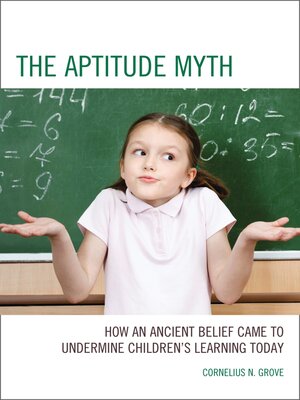The Aptitude Myth
ebook ∣ How an Ancient Belief Came to Undermine Children's Learning Today
By Cornelius N. Grove

Sign up to save your library
With an OverDrive account, you can save your favorite libraries for at-a-glance information about availability. Find out more about OverDrive accounts.
Find this title in Libby, the library reading app by OverDrive.



Search for a digital library with this title
Title found at these libraries:
| Library Name | Distance |
|---|---|
| Loading... |
The Aptitude Myth addresses the decline in American children's mastery of critical school subjects. It contends that a contributing cause for this decline derives from many Americans' ways of thinking about children's learning: They believe that school performance is determined very largely by innate aptitude. The Aptitude Myth traces the deep historical origins, the spread and elaboration, and the eventual triumph of the belief in the determining power of mental abilities "given" at birth and therefore fixed. Covered is 600 B.C.E. until 1926 (when the S.A.T. was first administered).
The belief in aptitude, assumed by many Americans to be the modern view of learning ability, is revealed as an archaic way of thinking that originated in the imaginations of our ancient forebears and gradually gained credibility over 2,500 years. In recent times, the belief became elaborated to include the fanciful notion that more-than-modest academic study injures a child's health. Having inherited this mindset, Americans don't know how to insure that children gain mastery. A new mindset is needed. The final chapter offers a transformative mindset.
The belief in aptitude, assumed by many Americans to be the modern view of learning ability, is revealed as an archaic way of thinking that originated in the imaginations of our ancient forebears and gradually gained credibility over 2,500 years. In recent times, the belief became elaborated to include the fanciful notion that more-than-modest academic study injures a child's health. Having inherited this mindset, Americans don't know how to insure that children gain mastery. A new mindset is needed. The final chapter offers a transformative mindset.







